|
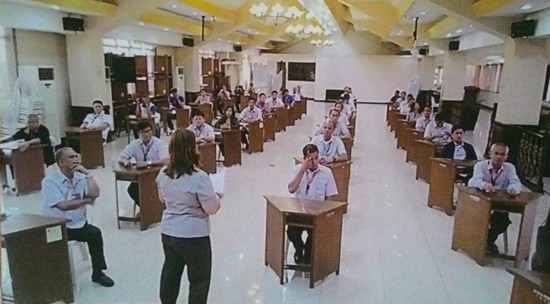
To
gauge the effectiveness of the training, a comprehensive exam
was conducted to the participants on the last day of the
District Engineer Candidate training Course on June 9, 2017 at
the DPWH Central Office Training Room, Manila. Engr. Alfredo L.
Bollido, (sitting front most right) OIC-Assistant District
Engineer of Biliran District Engineering Office is one of the
examinees of the training. |
ADE Bollido attends
district engineer candidates training course
Press Release
July 14, 2017
NAVAL, Biliran – Engr.
Alfredo L. Bollido, OIC-Assistant District Engineer of Biliran
District Engineering Office (DEO) attended a 24-day District Engineer
Candidates Training Course from May 9- June 9, 2017 at the Department
of Public Works and Highways (DPWH), Central Office, Manila.
The seminar workshop was
participated by 38 incumbent OIC-District Engineer, Assistant District
Engineer and OIC- Assistant District Engineer of the DPWH from
different Regions of the country.
Considering the very
delicate and vital task of the department, Engr. Bollido said that the
24-day course for District Engineers is designed to equip them with
all the knowledge and skills that would make them competent and
effective in their roles and responsibilities in various stages of
project implementation.
Due to the nature of the
course, a variety of specialist resource personnel were invited within
and outside DPWH with expertise in the design, construction,
maintenance, materials quality control, project management, legal,
financial and administrative discipline.
Engr. Bollido said that the
training courses were divided into seven modules which cover the whole
24-day of training from 8:00AM - 5:00PM inclusive of one Saturday for
Project Evaluation an Assessment (Field).
Discussed under Module I are
the Principles of Management which mainly focuses on the Overview:
Management and Functions Planning, Organizing, Leading and
Controlling; Module II - Planning and Design which focuses on the
Environmental Impact Assessment and Detailed Feasibility Study; Module
III Contract and Resource Management which focuses on Communication
Management: The Importance of Stakeholders Relations and
Communications in Infrastructure Projects; Resources Management-
Equipment Utilization/ Allocation and Financial Management and
Control; Module IV- Construction Methods; Module V-Materials Quality
Control; Module VI – Project Monitoring and Control and Module VII –
Administrative and Legal Discipline which highlights the
Accountability of Public Officials.
Bollido revealed that the
methodologies employed during the training include lecture-discussion,
audio-visual presentation, workshop, case studies and project
evaluation and assessment.
“After every discussion, an
intellectual exercise were given at the end of every module and before
graduation, a comprehensive exam was given to us on the last day of
the training to gauge its effectiveness,” said Bollido.
At the end of the course,
participants were expected to enhance their managerial skills in
project implementation through following procedures for various
project categories, design data, criteria and standards; undertake and
evaluate the planning, design, construction, and schedules of
projects; undertake project evaluation and supervision of maintenance
of such local roads, and other infra projects; apply quality control
measures in project implementation; acquire the necessary know-how on
effective and efficient utilization and management of manpower,
materials and equipment; acquire effective communications in project
management; apply the latest and innovative approaches/ techniques in
project management; and be aware of the values that a District
Engineer should possess and internalize in their roles and
responsibilities.
The 24-day training ended
with the giving of certificates to all participants who successfully
completed the requirement of the course for the District Engineer
Candidates Training.
Coconut association
clarifies AHA’s advisory on coconut oil

By DTI-TIPG-EMB
July 12, 2017
MAKATI CITY – United
Coconut Association of the Philippines (UCAP) recently issued a
statement clarifying the American Heart Association’s (AHA) advisory
against the consumption of coconut oil.
In the statement, UCAP
mentioned that the advisory has gone viral with adverse effect on the
coconut oil since it is considered a saturated fat. UCAP called on
readers and users of coconut oil to be discerning of the said advisory
and news articles drawing conclusion that coconut oil is unhealthy.
According to Dr. Fabian M.
Dayrit of the Ateneo De Manila University, the AHA adopted a position
that ignores the distinction between medium-chain fatty acid (MCFA)
and long-chain fatty acid (LCFA) despite the numerous advances in this
certain field of science. Coconut oil is mostly medium-chain saturated
fats, the healthy type of fat. Detailed comparison of the fatty acid
composition shows that coconut oil is very different from animal fat.
Hence, studies that assume they are similar are consequently in error.
Furthermore, Asian and
Pacific Coconut Community also highlighted in their recent statement
the words of Dr. Bruce Fife, a USA Certified Nutritionist and Doctor
of Naturopathy Medicine, “You cannot say LDL is bad and HDL is good.”
He explained the two types of LDL: one small and dense, while the
other is large and soft. The large LDL is the type that is used in
making bile, hormones, and Vitamin D, which are all good for one’s
health. Dr. Fife further concluded that, “Eating coconut oil (and
other saturated fats) increases both HDL and the “good” LDL, thus,
lowering the risk of heart disease. This is one of the reasons why
populations that eat a lot of coconut oil have the lowest heart
disease rates in the world.”
Department of Trade and
Industry’s Export Marketing Bureau (DTI-EMB) concurs with the stand of
industry associations such as United Coconut Associations of the
Philippines, Inc. and the Asian and Pacific Coconut Community that the
advisory is misleading as AHA based its findings on limited studies on
saturated fats.
"This is not the first time
this kind of negative publicity against coconut oil has happened. If
we will look closer to historical accounts, this has happened before.
It was magnified this time due to social media and technology," said
DTI Export Marketing Bureau Director Senen M. Perlada.
By and large, DTI will
continue to support the industry in sharing the good news about
coconut and its economic contribution to millions of Filipino farmers
and exporters.
Backed by recent studies and
firsthand experiences of its consumers around the globe, DTI will help
sustain the impressive health and economic contribution of coconut
products such as coconut oil, virgin coconut oil, coconut water,
coconut sugar, among others, by continued promotion through roadshows
in various markets which will eventually bring additional jobs and
income opportunities for Filipinos especially in the countryside.
American Heart Association
(AHA) issued a Presidential Advisory on Dietary Fats and
Cardiovascular Disease (CVD) on 15 June 2017 which recommended a
decrease in consumption of products high in saturated fat such as
dairy fat (butter), lard (pork), beef tallow, palm oil, palm kernel
oil, and coconut oil.
Lumad forced to
evacuate anew for fear of aerial strikes
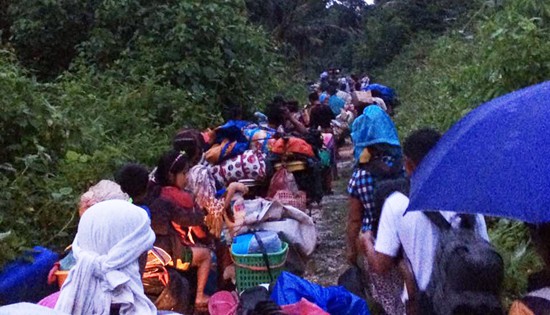
Press Release
July 7, 2017
SURIGAO DEL SUR –
“Hindi naman kami terorista pero kami ang inooperasyon ng militar” (We
are not terrorists yet we are targeted by military operations),
Josephine Pagalan, a Lumad council member of Sandugo – Movement of
Moro and Indigenous Peoples for Self Determination said a day after
2,047 Lumad residents of Lianga, Surigao del Sur left their homes for
fear of airstrikes. This came after the Supreme Court upheld Pres.
Duterte’s martial law in Mindanao due to the terrorist threat of ISIS
in Marawi City.
On July 5, 2017 at around
1am, a bomber plane of the Armed Forces of the Philippines (AFP)
hovered around the mountains in the nine communities of Lianga,
including Han ayan, where two years ago Lumad leaders Datu Juvello
Sinzo, Dionel Campos and school administrator Emerito Samarca were
massacred by Magahat-Bagani paramilitary group with the 36th Infantry
Battalion. The 75th IBPA, 36th IBPA and 6th Special Forces Battalion
have been conducting military operations in these areas since July 3,
2017.
Pagalan also represents
Malahutayong Pakigbisog Alang sa Sumusunod (MAPASU), a Lumad
organization based in the Caraga region.
“Hindi pa nga kami
nakakabangon sa pagbabakwit namin, nagbabakwit na naman kami” (We have
yet to recover from being dislocated, and now we are again forced to
evacuate), Pagalan said. The Lumad from Lianga spent more than a year
in an evacuation center in Tandag City after the massacre on September
1, 2015. They returned in 2016 to find their homes and fields
ransacked and wrecked.
“Ang mga Lumad at Moro ang
binibigwasan ng batas militar. Nasisira ang buhay at kinabukasan ng
aming mga anak dahil hindi makapag-aral,” (The Lumad and Moro bear the
brunt of martial law. Our lives and our children’s future our
destroyed with their schooling interrupted) Pagalan said. “Military
approach has never been an effective solution to the country’s
problems. Martial law and All-Out war only impacts their way of life
and culture, thus driving them to fight back,” Pagalan said.
“Kung gusto talaga ni Pres.
Duterte na matigil ang rebelyon o maging ang terorismo , kailangang
malutas niya muna ang mga dahilan ng armadong tunggalian. Sa aming mga
pambansang minorya, ito ay kahirapan, pang-aagaw sa lupang ninuno at
teritoryo at daang taong karahasan,” (If Pres. Duterte truly wants to
end rebellion or even terrorism, he first needs to resolve the roots
of the armed conflict. For us national minorities, this is poverty,
land grabbing of ancestral lands and territories and hundred years of
violence) Pagalan said.
A total of 633 Lumad
students including 43 volunteer teachers from the Alternative Learning
Center for Agricultural and Livelihood Development (ALCADEV), Inc. and
five community schools run by the Tribal Filipino Program of Surigao
del Sur are affected with the suspension of classes due to the
evacuation. The evacuees, are curently staying at the Simowao Tribal
Community School.
16 PH firms bag
US$23.4 export sales in major Taiwan food show
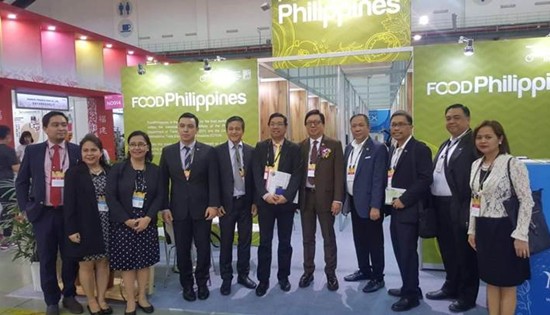
By CITEM
July 5, 2017
MANILA – Sixteen (16)
Philippine food companies generated US$23.4 million worth of export
sales in the recently held Taipei International Food Show (TIFS) at
the Nangang Exhibition Center Hall 1 in Taiwan last June 21-24.
Led by the Center for
International Trade Expositions and Missions (CITEM), the Philippine
delegation in TIFS 2017 surpassed the target sales of US$22 million
and exceeded the previous US$21.58 sales generated in 2016 by 8.4
percent.
“The Philippines had a
successful participation in Taiwan. We surpassed our sales goal and
actually brought 16 companies under the Philippine banner from an
initial target of 12 companies,” said CITEM Executive Director Clayton
Tugonon. “We were also able to share necessary information to these
companies so that they can capitalize on the promising market
opportunities in Taiwan.”
Part of the Philippine
delegation are Celebes Canning Corporation, CJ Uniworld Corporation,
DMI Medical Supply Company, Inc., Fitrite Inc., Greenlife Coco
Products Philippines, Inc., JNRM Corporation, Malagos Agri-Ventures
Corp., Mama Tina Pasta Company, Inc., Pasciolco Agri-Venture,
Prosource International Inc., Raw Brown Sugar Milling Company, Inc.,
Team Asia Corporation, Tropicana Food Products, Inc., Weambard
International Traders, Inc., and Yearluck Food and Industrial Food
Corporation. Also included is the Department of Science and
Technology-Industrial Technology Development Institute (DOST-ITDI).
Among the Philippines’
best-sellers in the event were ready-to-drink tropical fruit juices
and preserves; canned tuna; coconut products, such as virgin coconut
oil, coconut cream, sugar and medium chain triglycerides (MCT);
muscovado sugar in powder form and rock form; banana chips;
soft-served ice cream mix, cones and waffles; and herbal tea, MX3
coffee and food supplements.
Other products showcased in
the Philippine pavilion included unsweetened chocolate powder, roasted
cacao nibs and dark chocolates; bagoong; noodle pasta; canned meats;
vacuum-fried vegetables and fruits; and premixed rice cakes and other
food flavorings.
"Through our benchmarking
and market visits, we observed that the Taiwanese market has a huge
demand for health and organic food and beverages. There is also a big
market potential for exporting high value fresh/frozen high-value
fish, shrimps and prawns, abalone, scallops, and other seafood
products,” said Tugonon.
“We also surveyed that the
major international competitors for the Philippines’ best-selling
products were China, Vietnam, and Thailand because of their price and
packaging. Sri Lanka was also found as one of the toughest competitor
for coconut products, while European countries, such as Switzerland,
are also seen as a major competitor for chocolate products,” he
explained.
The TIFS, or popularly known
as FOOD TAIPEI, is an annual food fair that links the entire food
industry supply chain in Taiwan and other countries – from agriculture
and aquaculture, refrigeration, processed food, food machinery,
packaging and packaging equipment.
The four-day event was held
in conjunction with Taipei Pack, Foodtech & Pharmatech Taipei, Taiwan
Horeca and Halal Taiwan. It was participated by 1,717 exhibitors with
a total of 4,011 booths, including participating representatives from
36 countries, to cover every link of the supply chain in Taiwan.
“CITEM looks forward to its
next participation in FOOD Taipei next year. Hopefully, our
participation this year has helped Philippine companies benchmark
themselves in the international market to better improve their
packaging, product labeling, and secure the necessary food standards
and certifications to expand their reach on the Taiwanese export
market,” said Tugonon.
According to the show
organizer, the Taiwan External Trade Development Council (TAITRA), the
local revenue of the Taiwan food industry has already reached NT$ 618
billion (US$ 20 billion), and it is expected to increase to NT$ 620
billion (US$ 21 billion) by the end of 2017.
|
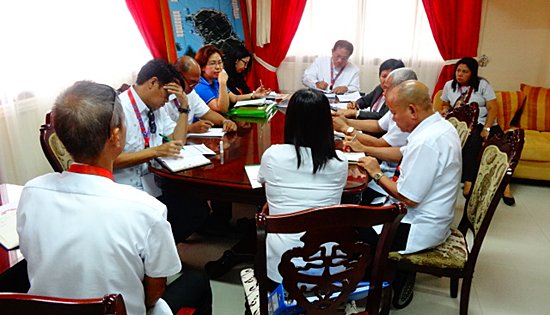
Department
of Public Works and Highways (DPWH) – Internal Audit Service (IAS)
conducts exit conference for ISO 9001:2015 Certification with
Biliran District Engineering Office (BDEO) key officials headed
by District Engineer, David P. Adongay Jr. on June 28, 2017 at
BDEO’s Conference Room. |
DPWH-IAS conducts
management audit at Biliran DEO for ISO 9001:2015
Press Release
June 30, 2017
NAVAL, Biliran – The
Department of Public Works and Highways (DPWH) - Internal Audit
Service (IAS) conducts its first management audit at Biliran District
Engineering Office (BDEO) for the ISO 9001: 2015 Certification.
According to Engr. David P.
Adongay, Jr., District Engineer, the main objective of the auditing
process is to ensure that all the processes in the office are in
accordance with the standard of the department.
“The auditing process makes
sure that what we are doing here in the Department of Public Works and
Highways district office follows the principles of quality management
system”, said Adongay.
The auditing process took
two days from June 27-29, 2017 which started with a conference with
key officials of BDEO and from the auditing team.
DPWH-IAS from the Central
Office represented by Ms. Ma. Cristina Suyom and Ms. Erlyn Caguiroa
scrutinized BDEO of its different processes in the office.
According to Adongay the
audit process for the ISO 9001:2015 was focused on leadership,
engagement of people, evidence-based decision making, relationship
management and improvement.
The auditing process ended
with an exit conference where the audit team discusses their findings
and assessment of BDEO and the areas that need improvement.
Adongay said that the result
of the audit process is satisfiable.
“If I would round it in the
scale of 1-10, I think we scored nine because based from our exit
meeting with IAS, most of the findings can be immediately corrected,”
said Adongay.
Adongay also revealed that
the next auditing process for BDEO’s journey to ISO 9001:2015
Certification will be in the month of August.
According to Adongay, the
office is preparing audit by the third party, Anglo Japanese American
(AJA).
“We just had our meeting and
we discussed about the inputs of the management review and we are
expecting that our section chiefs, unit heads as well as other
employees will follow the Quality Management System as far as the
operation of our office is concerned. So everything that we had
discussed, needs their immediate action and we are going to follow it
up in a weeks time,” Adongay disclosed.
A New Book -
Torture: as an entrenched part of Cruel, Inhuman & Degrading Legal Systems
By Asian Human Rights
Commission
June 30, 2017
A
Study on the use of torture as a routine part of criminal
investigations in developing countries; lessons from the situation in
Sri Lanka
HONG KONG
– The Asian Human Rights Commission is happy to present its latest
publication which is now available in print and as an e-book. The book
is based on over 20 years of work attempting to expose glaring flaws
of criminal justice systems in particular and the overall legal
systems in general of the developing countries which prevents people
living in these countries from actual achievement and enjoyment of
basic human rights. This is done by way of selected study on the
widespread use of torture and ill-treatment in these countries, which
is a direct result of the defects that exists in the systems of
justice. The flaws in the policing systems, prosecution systems and
judicial systems which instead of protecting the rights of people, in
fact becomes an obstacle to their achievement – is being analyzed in
detail in this book.
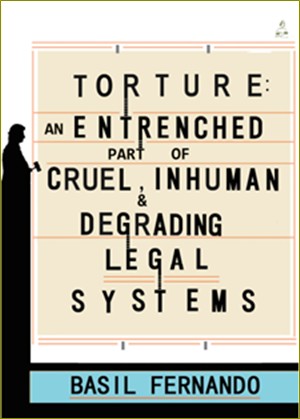 Detailed studies on the defects of Sri Lanka’s justice systems are
used in this book as illustrations of common problems that exist in
almost all developing countries.
Detailed studies on the defects of Sri Lanka’s justice systems are
used in this book as illustrations of common problems that exist in
almost all developing countries.
The book uses details of actual stories documented over a long period
to illustrate various questions and issues highlighted in the book.
Then a detailed analysis is made of these narratives to explain the
root causes for the prevalence of such extremely defective systems and
the unwillingness of the Governments to improve or to reform these
systems.
In one instance, the story of a young man who made a complaint against
a few police officers of a particular police station, regarding
illegal arrest and torture is used as an illustration. The result of
the complaint was that he, his mother and his father were made to
disappear as a way to erase all evidence against the police officers
who allegedly violated his rights. Nearly 30 years have passed since
this incident which is well-known, but the state has made no attempt
at all to investigate this heinous crime. This illustrates that
despite of widespread knowledge about very serious crimes, the
Governments can ignore them as matters of no consequence. When serious
crimes become matters of no consequence, it is an indication that no
amount of legislation would be of ant use if the state neglects the
enforcement of such laws. When law itself becomes irrelevant, can
human rights be regarded as relevant and important in these societies
- is the question that the book poses, quite poignantly.
The Book consists of four parts; first part deals with the impact of a
bad system of justice on judges, lawyers, law enforcement officers,
civil servants and all citizens in the country, who all suffer by way
of a deterioration of their intellect and capacity for rational
living; second part deals with the consequence of introducing what was
called “constitutional autochthony”, which in Sri Lanka meant
displacement of separation of powers and other basic tenants of
liberal democracy; the third part deals with the manner in which the
deterioration of the Legal System affected the entire political
system; the last part gives graphic details of how the crisis of
justice system is manifesting itself in contemporary Sri Lanka.
The aim that the book is pursuing is well summarized is its
dedication. This book is dedicated to the hope that a better
understanding may emerge of the wrongs that people who live in
countries with broken justice systems suffer, giving rise to a
heightened level of concern and a drive to undo such wrongs through
local and international strategies and actions, all to create
environments where the life and liberties of people are protected.
The foreword to the book has been written by Dr. Sunil Coorey, Senior
Counsel and author of the monumental work, Principles of
Administrative Law in Sri Lanka, who writes that the “biggest obstacle
to the eradication of the practice of torture by the Police is the
apathy with which the State machinery as a whole and those in the
higher strata of society (including judges, lawyers and the
comparatively well to do), look upon it”.
Copies of the book can be obtained from the Asian Human Rights
Commission based in Hong Kong and will soon be available in book shops
as well as an e-book.
|
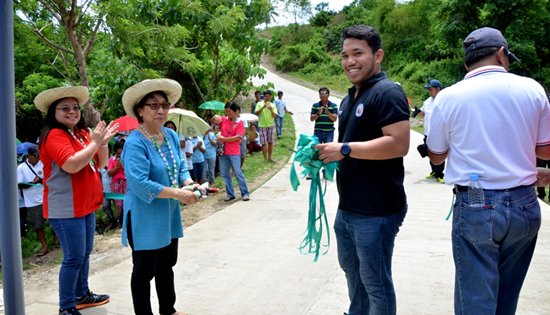
DAR
Undersecretary Sylvia Mallari (2nd from L) and Mayor Philip
Martin Astorga (2nd from R) cut the ceremonial ribbon during the
inauguration and turnover of the 12.4-kilometer farm-to-market
road implemented under the second phase of the Agrarian Reform
Communities Project (ARCP-II) in the island-municipality of
Daram, Samar. Assisting them are DAR Regional Director Sheila
Enciso (L) and Provincial Agrarian Reform Program Officer
Enrique Granados III (R). |
DAR turns over
third FMR in Daram
By JOSE ALSMITH L. SORIA
June 28, 2017
DARAM, Samar – As the
Department of Agrarian Reform (DAR) commemorates this month the 29th
year of implementation of the Comprehensive Agrarian Reform Program
(CARP), said agency turned over on Monday to the local government unit
its third and longest farm-to-market road project constructed in this
island-municipality.
Undersecretary Sylvia
Mallari led the turnover rite of the 12.4-kilometer all-weather road
held in Barangay Birawan, some seven kilometers away from the town
proper.
“This is in line with the
President’s pronouncement, Build! Build! Build!” Mallari said
referring to the road project. “Upang patuloy ang pag-unlad ng
kabuhayan, at magkaroon ng kapayapaan sa kapaligiran” she added.
In his acceptance message,
Mayor Philip Martin Astorga stressed the benefits this project would
bring to his town. According to him, this would serve a faster way to
travel across the island, and further spur development through
agriculture.
Residents of this
municipality used to travel around the island by motorboat in the
absence of a road.
Implemented under the second
phase of the Agrarian Reform Communities Project (ARCP-II), this road,
according to Municipal Agrarian Reform Program Officer Alfonso Jalalon,
passes through seven barangays; Mabini, Ubo, Birawan, Astorga,
Marupangdan, San Vicente and Bono-anon that would be benefited by the
more than 5,600 residents in the area wherein about 500 are agrarian
reform beneficiaries.
Regional Director Sheila
Enciso disclosed that the total cost of this project, where critical
portions of five kilometers are concreted, reached P48.9-million being
shared by the LGU and a loan from the Asian Development Bank by the
national government.
Thus, Enciso reminded the
recipients to maintain it in good condition for 10 years. Otherwise
the loan portion comprising 40 percent of the total cost will likewise
be shouldered by the LGU.
Vice Mayor Lucia Astorga,
who was the mayor during the planning stage, never forgot to mention
in her welcome message former ARCP-II National Project Director Homer
Tobias for considering this municipality and became a recipient of
three farm-to-market roads making almost all barangays not only
accessible, but opening livelihood opportunities as well.
According to her, the 40
percent share of the national government is of big help in the
realization of this town’s dream of building road networks.
Meanwhile, aside from the
convenience they now experience in hauling farm products for trading,
Birawan Kagawad Leonardo Papawran enumerated other benefits they are
now enjoying with the existence of this road.
He disclosed that the road
provided many residents another source of livelihood as motorcycle
drivers.
It also serves as an
alternate route during bad weather when not safe to travel on waters.
Likewise, Papawran
emphasized, the youth from other barangays would now be encouraged to
enroll at the Birawan National High School.
1 NPA captured
during a brief fire fight
By DPAO, 8ID PA
June 27, 2017
CAMP LUKBAN, Catbalogan
City – A platoon from Samar Provincial Public Safety Company (SPPSC)
and a team from Alpha Company, 87th Infantry (Hinirang) Battalion
while conducting Focus Military Operation (FMO) at Sitio Opong,
Barangay Veloso, Marabut Samar encountered about 15 fully armed
communist terrorists on June 26, 2017 at 5:00 o’ clock in the morning.
A five-minute fire fight
ensued which resulted to the capture of a certain Jojo Gerilla and the
recovery of one (1) .45 pistol with one (1) magazine; assorted
cartridge of M-16 5.56mm and M-14 7.62 mm empty shell; IED power
source and triggering device with 200 meters of firing wire and five
(5) kilograms of rice.
The forewarning on the
presence of an armed group from concerned villagers in the area shows
a good rapport between the military and civilian populace which is a
shared responsibility in preventing the communist terrorists to
conduct atrocities that could impede the peace and development in the
region.
This NPA terrorist group
shows how desperate and inconsiderate they are despite of the on-going
tension in Marawi City. Henceforth, they cannot stop our military
troops in pursuing security operations until their presence is still
in Eastern Visayas. We encourage everyone to follow the path of peace
and condemn those terrorist whose advocate is to bring violence and
threat in the whole region.
Likewise, Maj. Gen. Raul M.
Farnacio, 8ID Commander commended the combined team from the Army and
PNP for their efforts and dedication in the performance of their
mandated duty. The 8ID is providing support to the Philippine National
Police and other concerned government agencies in creating a concept
and understanding that security is a shared responsibility not just
among security forces and government institutions but also of
civil-society and the community.